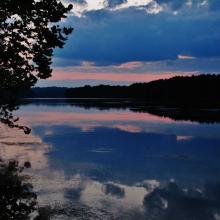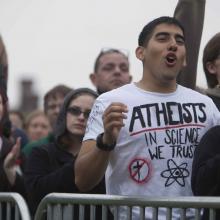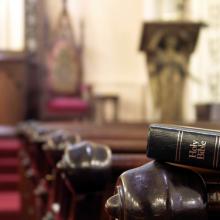unaffiliated
Except for presidential candidates and some parts of the Bible Belt, the days when church membership was necessary for social acceptance are long gone. Many Americans view religion as suspect or superfluous or both.
In fact, the latest data from the Pew Forum on Religion & Public Life say that a record-high one in five Americans -- and one in three adults under age 30 -- are religiously unaffiliated.
So why did all 1,500 seats sell out for a debate I moderated a few months ago entitled “Has Science Refuted Religion?” at the California Institute of Technology? Why should the brilliant minds of the Caltech community even care, especially since skeptics, rather than true believers, made up the majority of the audience?
As the dean of a theology school, the question is of high interest to me, and I think I know the answer.
OK, church folks. Fasten your seat belts. But don’t hunker down.
There’s a new study out this week that shows that one-in-five Americans has no religious affiliation. Not Baptist, not Catholic, not Lutheran, not Jewish, not Muslim.
For those of us in the world of organized religion, this just adds more data to a trend we have seen accelerating over the last decade.
In 2007, about 15 percent of the adult population in the U.S. described itself as unaffiliated with any religion. In a comparable survey done this summer and released on Tuesday by the Pew Research Center’s Forum on Religion and Public Life, the number hit 20 percent. And if you just focus on those under 30, the religiously unaffiliated constitute one third of that group.
Among those of us who are professional religious types, this is the kind of data that can prompt a lot of gloomy introspection about relevance and a lot of finger pointing at those who are not interested in the same kinds of religious expression that we are.
Let me suggest there’s a less gloomy and less judgmental way to think about this data.

Editor's Note: Melissa Otterbein tells her story of why she's part of the 20 percent of Americans who identify with "no religion in particular."Find more stories (or share your own) HERE. Read about the study HERE.
A "recovering Evangelical," author Melissa identifies with the "nones" after church experiences in the non-denominational Church, Lutheran Church, Church of God, United Church of Christ, and the kind of Church that happens when you have hour-long conversations with people who are materially poor yet rich in spirit. Each of these "Churches" (and those not mentioned) depict Christ in beautiful ways, she believes, but feels that solely identifying with a denominational designation hasn't seemed to fully capture her faith experience. Though "none" might seem like a shocking response to "which religious tradition do you closely identify with?" it's one that, "offers freedom in Christ that brings me to closer to the Kingdom of God in the here and now."
I am tired of explaining away my faith.
I am tired of defending, “proving,” withholding my true feelings for fear of religious retaliation.
I’m tired of watching some people argue their faith, trying to “win people to Christ” with their cogent, convincing “answers.”
I’m tired of watching Jesus be sold, marketed, put on display.
I’m tired of watching certain people try to convince the world why their God is the right God.
I’m tired of listening to people deify their Bible by retorting this verse and that verse when our God is so much bigger than the sole medium of Genesis-Revelation.
I’m tired of platitudes about the Word and faith and sin and grace that I’ve heard over and over again; for every time I hear these trite remarks, I question if we’ve lost the unadulterated beauty behind such venerable passages.
 Meet John Q. Nones, a young, white male who is making a big impression on the American religious landscape for something he doesn't do: align with any religious group.
Meet John Q. Nones, a young, white male who is making a big impression on the American religious landscape for something he doesn't do: align with any religious group.
The rise of the religiously unaffiliated, or “nones,” as documented in a new study from the Pew Forum on Religion & Public Life, has major implications for almost all aspects of American life -- from religion to business to culture.
Whether you believe the proliferation of Mr. Nones is a depressing or hopeful trend, it pays to get to know him.
Who is John Q. Nones? Here's a snapshot drawn from the Pew Forum’s new poll.
Editor's Note: Sojourners has launched this new blog series to help shed light on the nation's latest "religious" affiliation. Scroll down to read their stories. Or EMAIL US to share your own.
Which religious tradition do you most closely identify with?
- Protestant
- Catholic
- Mormon
- Muslim
- Jewish
- Orthodox
- Other Faith
- Unaffiliated
Given these options — or even if you throw in a few more like Buddhist, Hindu, Agnostic — I would choose “Unaffiliated.” That puts me into a category with one-in-five other Americans, and one-in-three millennials, aptly named the “nones.”
In that vein, I introduce our new blog series: Meet the Nones. Through this series, I hope to encourage discussion, debate, and elucidate the full picture of what it means to be losing your religion in America.
Editor's Note: Would you like to share your story on this topic? Email us HERE.
One-in-five adults in the United States — and a third of adults under 30 — say they have no religious affiliation. The numbers are out in a new report called “’Nones’ on the Rise,” put out by the Pew Forum on Religion and Public Life. That 20 percent of the population is up from 15 percent just five years ago.
But while our church membership rolls may be shrinking, “unaffiliated doesn’t necessarily mean wholly secular,” said senior researcher Cary Funk at the Religion Newswriters Association Conference in Bethesda, Md., on Saturday.
In fact, two-thirds of the 46 million Americans self-identifying as having no religion also say they believe in God. And 21 percent of them say they pray every day. A large portion of this group — 37 percent — say they consider themselves “spiritual but not religious.”
The increase in disaffiliation goes hand-in-hand with an overall lack of trust in American institutions across the board, from the government to the news media, and now, to our houses of worship.
The “nones” overwhelmingly say religious institutions are too concerned with money and power, and 67 percent say they both focus too much on rules and are too involved in politics.
Religiosity is on the decline in the U.S. and atheism is on the rise, according to a new worldwide poll.
The poll, called “The Global Index of Religiosity and Atheism,” found that the number of Americans who say they are "religious" dropped from 73 percent in 2005 (the last time the poll was conducted) to 60 percent.
At the same time, the number of Americans who say they are atheists rose, from 1 percent to 5 percent.
The poll was conducted by WIN-Gallup International and is based on interviews with 50,000 people from 57 countries and five continents. Participants were asked, “Irrespective of whether you attend a place of worship or not, would you say you are a religious person, not a religious person, or a convinced atheist?”
The seven years between the polls is notable because 2005 saw the publication of The End of Faith by Sam Harris, the first in a wave of best-selling books on atheism by Christopher Hitchens, Richard Dawkins, Daniel Dennett and other so-called “New Atheists.”
Chris is an atheist and a humanist chaplain at Harvard University. He is the only explicitly nonreligious speaker invited to the 2012 Wild Goose Festival in Shakori Hills, N.C.—a festival that is generally (and with exception) aimed at the liberal, often-invisible fringe members of the Christian community. Being that I theoretically fall into this group, Chris offered me his plus-one free ticket.
While it generally takes an act of God (or, “a series of convergences” Chris might say) for me to make a decision, I told him I’d go. After all, I’d been experiencing my own dark night of the soul where almost every conversation I’ve had about religion/ Christianity over the last year has been doubt-ridden and cynical. In my best mood, I hoped my attendance would put me in touch with some other cynics, believing it might relieve my cosmic guilt. What I secretly feared, however, was that I was going to Wild Goose to break up with the Christian faith I’d grown up under.
The Church is not a purity cult. We try to turn our institutions into purity cultus of behavior or belief all the time. We're really good at it. We've fought wars over our theologies wrapped in nationalism. We've crusaded from west to east all in the name of the purity of the Church. "Ex filio" was a war cry a thousand years ago.
Rachel Held Evans is right. Evangelicalism may very well be losing a generation and by extension, we all are. But then some of us have been losing parts of generations for a long time. Some of the Boomers walked never to return. More of Gen X did the same. Now the enormous generation of Millennials is having its say. Many are voting with their feet. They are tired of the culture wars. They are tired of the purity fights. Many people from various generations are. They are all voting with their feet. The same thing is happening in Catholicism though some are choosing to stay. If it weren't for the influx of Catholic immigrants to the US, we'd see the same statistical free fall in Catholicism that the mainline is experiencing.
As part of the rollout for "Millennial Values Survey" from Public Religion Research and the Berkley Center, I sat at Georgetown University and listened to a very long list of what pollsters think makes up college-age millennials. I’m in the right age bracket, but I couldn’t stop thinking about what a difference just a few years makes.
I’m part of the millennial generation, albeit at the high end of the spectrum. At 29, my attitudes and behaviors look completely different to those on the lower end. Part of it, of course, is phase of life. I’m a professional, married, with a few life experiences under my belt. Most of the respondents of the survey are in college or recently graduated—half live with their parents.
In discussing the survey results with a 23-year-old friend, we worked through both obvious and subtle differences. Some key characteristics of this cohort, and perhaps ways to engage them, surfaced.
One in four young millennials (age 18-24) identify themselves as religiously unaffiliated—up from 11 percent in their childhood. But the distinguishing factor for this age group is that the “unaffiliated” label may stick with them into adulthood and beyond.
“This cohort is so dramatically different—racially, ethnically and religiously—it can’t help but change the character of our country,” Daniel Cox, director of research at Public Religion Research Institute, said at the presentation of the “Millennial Values Survey,” conducted by PRRI and Georgetown University’s Berkley Center for Religion, Peace and World Affairs.
In the past, young adults have tended to lapse in faith during their college years and twenties, only to return with age and family. Robert Jones, PRRI founder and CEO, said that’s not likely to happen as much with this age group.
“We’ve got to come up with some new measures of religion,” Jones said.

"Meet the Millennials," photo by TheeErin/Wylio (http://bit.ly/yZ7ZF9).
There has been a lot of talk lately — both in the public sphere and most definitely here at the Sojo offices—about young people leaving the church.
I would argue that--while some of my fellow millenials are jumping ship on Christiainity--many are not so much leaving the big-C “Church,” (see my post on the definition of the word), as they are leaving established churches. The surveys show a migration from a particular denomination to “no religion.” To me, that doesn’t say atheist/agnostic; it just says that this generation of Christians doesn’t want to be labeled.
If you look at the numbers, millenials are quitting the church, not quitting Jesus. Unaffiliated does not necessarily mean unChristian.
My generation doesn’t want the “Southern Baptist,” “Wisconsin Evangelical Lutheran Synod,” “Roman Catholic” affiliations thrust upon us. Not only do we disagree with some of the tenants of said denominations, but each title carries all sorts of baggage left at our feet.
We’ve seen post after post listing possible catalysts to twenty-somethings turning away from the religion of our fathers in droves. Presidential hopeful Rick Santorum blames college. The reasons listed here on God’s Politics, in books and by church leaders themselves each probably factor in to some degree.
But I do want to dismiss some of them.









